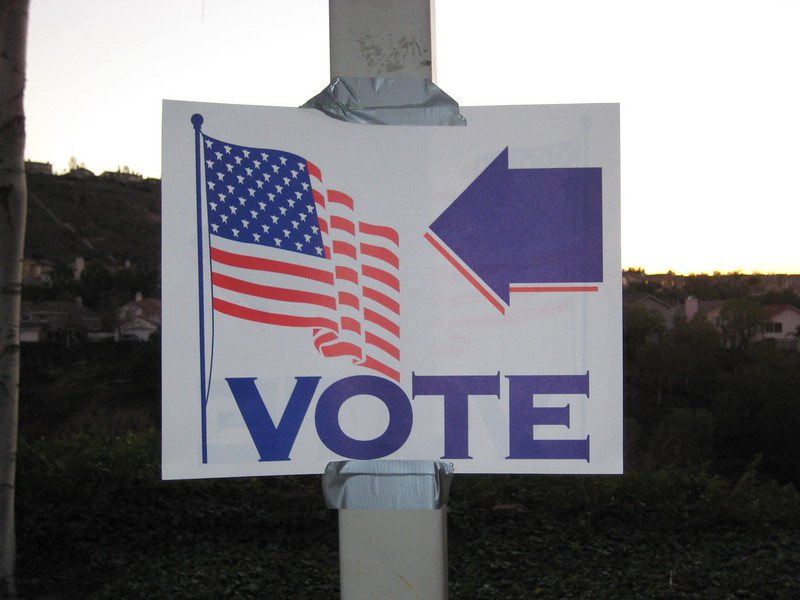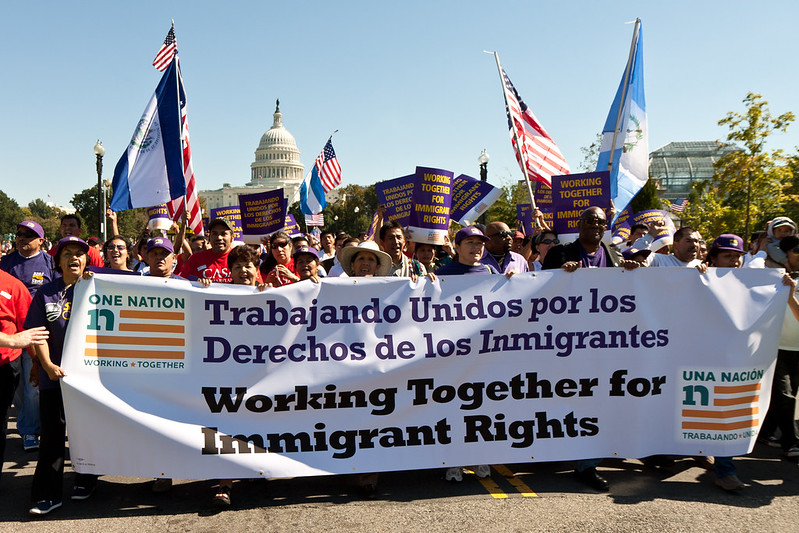American Presidential Candidates Court Latino Voters Posted by sasha on Jul 29, 2020 in Uncategorized
Habrá elecciones presidenciales en los Estados Unidos este noviembre (There will be presidential elections in the United States this November). Incumbent president Donald Trump of el Partido Republicano (the Republican Party) is going up against Joe Biden, former vice president and candidate of el Partido Demócrata (the Democratic Party). The Latino vote is more important than ever in 2020, meaning that this campaign is also being waged en español. Let’s take a look at how both American presidential candidates are attempting to court Latino voters.
El voto latino (The Latino Vote)
El voto latino es muy importante. Este año 32 millones de latinos pueden votar en las elecciones presidenciales de Estados Unidos (The Latino vote is very important. This year 32 million Latinos can vote in the United States presidential election). For perspective, that’s about 13% of the total electorate this year.
That means that for the first time ever, Latinos will represent the largest racial or ethnic minority in a US presidential election. So the question is – where are all of these voters located? A vast majority of them are in just a handful of states – California, Texas, Florida, New York, and Arizona. Candidates are focusing most of their attention on Latinos in the states of Texas, Florida, and Arizona, all of which are los campos de batalla (battleground states) this year.
While that may seem like a lot, it’s really only half the population of Latinos in the US, which is around 60 million. Muchos latinos en los Estados Unidos no son votantes elegibles (Many Latinos in the United States are not eligible voters). This is because 18.5 million are under the age of 18 and around 11 million are non-citizen adults.
As far as the 2016 election, over half of eligible Latino voters chose to sit it out. Although many didn’t want Trump to win, Hillary Clinton didn’t excite them enough to get them to the polls. The Biden campaign is hoping to turn that around this year, while even the Trump campaign is attempting to woo Latino voters. You may have seen “Latinos for Trump” signs at some of his campaign events this year.
Historically, Latino voters have leaned toward the Democratic Party. However, many hold a grudge against the Democrats and former president Barack Obama in particular, who many call “el deportador en jefe” (the deporter in chief).
For more, watch this piece from Telemundo titled “Las estrategia de Trump y Biden para atraer el voto latino (Trump and Biden’s strategies to attract the Latino vote):
Los asuntos (The Issues)
Estos son los tres asuntos más importantes para los latinos: atención médica, empleo y economía, e injusticia racial (These are the three most important issues for Latinos: health care, jobs and the economy, and racial injustice). The issue of health care is especially relevant during la pandemia de coronavirus (the coronavirus pandemic), which has hit Latino communities particularly hard.
For most Latino voters, they are most concerned with having economic opportunity and tackling the issue of racial discrimination. Por supuesto, la inmigración también es un asunto importante (Of course, immigration is also an important issue). Trump is trying to get rid of DACA (Deferred Action for Childhood Arrivals), which is sure to cost him with Latino voters. Meanwhile, Biden is pointing to the fact that it was the Obama administration he served in that started DACA in the first place.
Los anuncios (The Advertisements)
The Biden campaign is apparently spending $15 million to reach Latino voters. Their ads use a catchy play on words: “Los cuentos no pagan las cuentas,” which can be translated as “Tales don’t pay the bills.”
What’s most interesting about the ads Biden is running is the fact that they used different acentos (accents) depending on the region. For example, viewers in Miami will hear a Cuban accent while those in Arizona hear a Mexican one. This is what’s known as “micro-targeting” in the advertising world.
Here’s one version of the ad that the Biden campaign is currently running across the country:
As for the Trump campaign, they are trying to capitalize on the frenzy surrounding his administration’s relationship with Goya Foods – the country’s largest Hispanic-owned food company. The TV ad is narrated by the famous Cuban actress Susana Pérez. It’s running primarily in Florida and you can see it here:
In the ad, she says: “Ahora la izquierda le ha montado un acto de repudio a Goya la marca que nos encanta tan solo porque voy a estar trabajando con el presidente Trump” (Now the left has mounted an act of repudiation of Goya the brand that we love just because I will be working with President Trump). Many on the left have been calling for a boycott of Goya products after their CEO publicly endorsed Trump.
It’s quite possible that Latino voters could end up being the deciding factor in the 2020 US presidential election. Whether or not these ads pay off, and for which candidate, remains to be seen.
For a good Spanish listening exercise (as well as a refresher on US government), check out this YouTube video called “Requisitos para ser presidente de los Estados Unidos” (Requirements to be President of the United States) from USAGov:

Build vocabulary, practice pronunciation, and more with Transparent Language Online. Available anytime, anywhere, on any device.





